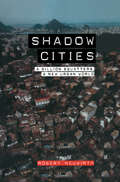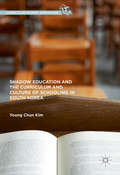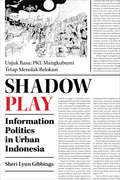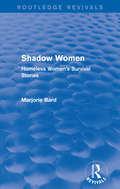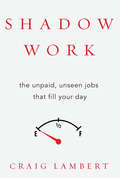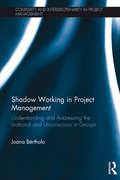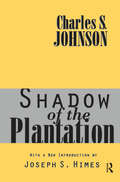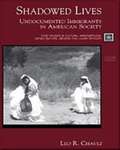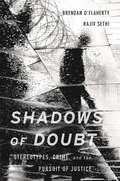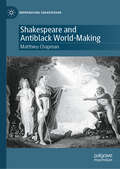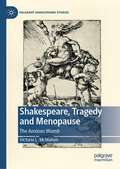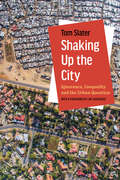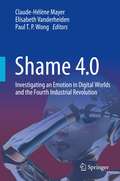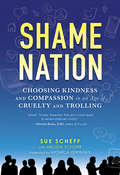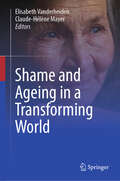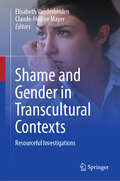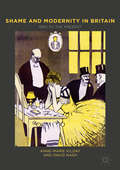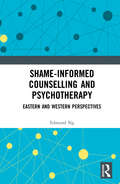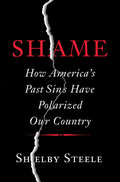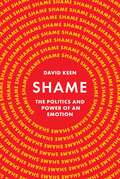- Table View
- List View
Shadow Cities: A Billion Squatters, A New Urban World
by Robert NeuwirthIn almost every country of the developing world, the most active builders are squatters, creating complex local economies with high rises, shopping strips, banks, and self-government. As they invent new social structures, Neuwirth argues, squatters are at the forefront of the worldwide movement to develop new visions of what constitutes property and community. Visit Robert Neuwirth's blog at: http://squatterci ty.blogspot.com
Shadow Economy in Poland: Recent Evidence Based on Survey Data (SpringerBriefs in Economics)
by Ewa Lechman Dagmara NikulinThe book provides an estimate of the size of the shadow economy in Poland. Using analogous data, it traces core determinants of the existence of the shadow economy in Poland. It compares results with neighbouring countries, and if possible, the remaining Central-Eastern economies.The book tells why the problem of the unreported economic activity matters; it presents the problem from different angles―economic, social and institutional. Next, it extensively reviews past research on the size and determinants of the shadow economy in Poland. It discusses available resources and empirical results showing the problem from micro-, and macroeconomic perspective. The authors present the methods used and the results of the survey, which are interpreted and discussed Finally it concludes on major drivers of shadow economy in Poland, providing recommendations and future research directions. The book is intended for practitioners and those seeking understanding of undeclared economic activities.
Shadow Education and the Curriculum and Culture of Schooling in South Korea (Curriculum Studies Worldwide)
by Young Chun KimThis book enables Western scholars and educators to recognize the roles and contributions of shadow education/hakwon education in an international context. The book allows readers to redefine the traditional and limited understanding of the background success behind Korean schooling and to expand their perspectives on Korean hakwon education, as well as shadow education in other nations with educational power, such as Japan, China, Singapore, and Taiwan. Kim exhorts readers and researchers to examine shadow education as an emerging research inquiry in the context of postcolonial and worldwide curriculum studies.
Shadow Play: Information Politics in Urban Indonesia (Anthropological Horizons)
by Sheri Lynn GibbingsFocusing on government-organized relocations of street vendors in Indonesia, Shadow Play carefully exposes the reasons why conflicts over urban planning are fought through information politics. Anthropologist Sheri Lynn Gibbings shows that information politics are the principal avenues through which the municipal government of Yogyakarta city seeks to implement its urban projects. Information politics are also the primary means through which street vendors, activists, and NGOs can challenge these plans. Through extensive interviews and lengthy participant observation in Yogyakarta, Gibbings shows that both state and non-state actors engage in transparency, rumours, conspiracies, and surveillance practices. Gibbings reveals that these entangled information practices create suspicion and fear, form new solidarities, and dissolve relationships. Shadow Play is a compelling study explaining how we cannot understand urban projects in post-Suharto Indonesia and the resistance to them without first understanding the complexities embedded in the information practices.
Shadow States: India, China and the Himalayas, 1910–1962
by Bérénice Guyot-RéchardSince the mid-twentieth century China and India have entertained a difficult relationship, erupting into open war in 1962. Shadow States is the first book to unpack Sino-Indian tensions from the angle of competitive state-building - through a study of their simultaneous attempts to win the approval and support of the Himalayan people. When China and India tried to expand into the Himalayas in the twentieth century, their lack of strong ties to the region and the absence of an easily enforceable border made their proximity threatening - observing China and India's state-making efforts, local inhabitants were in a position to compare and potentially choose between them. Using rich and original archival research, Bérénice Guyot-Réchard shows how India and China became each other's 'shadow states'. Understanding these recent, competing processes of state formation in the Himalayas is fundamental to understanding the roots of tensions in Sino-Indian relations. Analyses the daily dynamics of China and India's state- and nation-building in Tibet and the Himalayas. Contests standard narratives of the roots of the 1962 Sino-Indian War and India's defeat by China Brings to light the importance of the Himalayan people in China and India's relations. Draws on a variety of unexplored archives, including from Arunachal Pradesh itself.
Shadow Women (Routledge Revivals): Homeless Women's Survival Stories
by Marjorie BardFirst published in 1990, this book emerged from the author’s experiences talking to homeless women and her desire to bring these problems to light along with the social injustice that often underlies them. The book also describes being "at risk": a paycheck, widowhood, or unfair divorce settlement away from sleeping in a car, living in malls and parks, "dining" in grocery stores. The author intends to raise awareness, participation and proposes solutions that do not simply beg more government funded shelters but rather foster self-sufficient living and working by raising self-esteem and community spirit. This book will be of interest to students of sociology.
Shadow Work: The Unpaid, Unseen Jobs That Fill Your Day
by Craig LambertWith the exception of sleep, humans spend more of their lifetimes on work than any other activity. It is central to our economy, society, and the family. It underpins our finances and our sense of meaning in life. Given the overriding importance of work, we need to recognize a profound transformation in the nature of work that is significantly altering lives: the incoming tidal wave of shadow work.Shadow work includes all the unpaid tasks we do on behalf of businesses and organizations. It has slipped into our routines stealthily; most of us do not realize how much of it we are already doing, even as we pump our own gas, scan and bag our own groceries, execute our own stock trades, and build our own unassembled furniture. But its presence is unmistakable, and its effects far-reaching.Fueled by the twin forces of technology and skyrocketing personnel costs, shadow work has taken a foothold in our society. Lambert terms its prevalence as "middle-class serfdom," and examines its sources in the invasion of robotics, the democratization of expertise, and new demands on individuals at all levels of society. The end result? A more personalized form of consumption, a great social leveling (pedigrees don't help with shadow work!), and the weakening of communities as robotics reduce daily human interaction.Shadow Work offers a field guide to this new phenomenon. It shines a light on these trends now so prevalent in our daily lives and, more importantly, offers valuable insight into how to counter their effects. It will be essential reading to anyone seeking to understand how their day got so full-and how to deal with the ubiquitous shadow work that surrounds them.
Shadow Working in Project Management: Understanding and Addressing the Irrational and Unconscious in Groups (Complexity and Interdisciplinarity in Project Management)
by Joana BértholoShadow Working in Project Management aims at contributing to our knowledge of all things unconscious and irrational in our behaviour. It takes the form of an empirical research, and therefore addresses mostly the tools and techniques available to get in touch with Shadow aspects of self and collective, to recognize how it manifests, how it can lead to conflict, and ways to address it. From that perspective, it advances on to question the underlying beliefs of current management practices. It explores as well the inherent need for control in projects, being those of a professional nature, or other ventures. It challenges the strength of the concept of the "rational man" and its protagonism. Joana Bértholo’s work explores the role and nature of the Shadow in the context of projects and their management, with an emphasis on techniques to address it. Despite being directed to managers and dedicated to the analyses of the managerial discourse, the tools and processes it proposes have universal relevance, based on the fact that the Shadow is everywhere, within everyone, from the individual to the global scale.
Shadow of the Plantation
by Charles S. JohnsonShadow of the Plantation focuses on descendants of slaves in one rural Southern community in the early part of this century. In the process, Johnson reviews the troubled history of race relations in the United /States. When reread half a century after it was first written, Shadow of the Plantation is clearly revealed as a remarkably perceptive and fresh comment on race relations and the triumph of individuals over circumstances.Charles Johnson's book is significant for its use of multiple methodologies. The research took place in an ecological setting that was a dynamic element of the life of the community. The book is a multifaceted, interpretive survey of the 612 black families that composed the rural community of Macon County, Alabama, in the late 1920s and early 1930s. Johnson describes and analyzes their families, economic situation, education, religious activities, recreational life, and health practices.Shadow of the Plantation manages to be both historically accurate and foresighted at the same time. It is as much a book about today as it is a discussion of yesterday. This volume is an important study that will be of value to sociologists, anthropologists, and black studies specialists.
Shadowed Lives: Undocumented Immigrants in American Society
by Leo R. ChavezOne of the few case studies of undocumented immigrants available, this insightful anthropological analysis humanizes a group of people too often reduced to statistics and stereotypes. The hardships of Hispanic migration are conveyed in the immigrants' own voices while the author's voice raises questions about power, stereotypes, settlement, and incorporation into American society.
Shadows of Doubt: Stereotypes, Crime, and the Pursuit of Justice
by Brendan O'Flaherty Rajiv SethiCrime and punishment occur under extreme uncertainty. Offenders, victims, police, judges, and jurors make high-stakes decisions with limited information under severe time pressure. With compelling stories and data on how people act and react, O’Flaherty and Sethi reveal the extent to which we rely on stereotypes as shortcuts in our decision making.
Shadows of Time: Unveiling Crime, Victims, and Aging (International Perspectives on Aging #46)
by Jason PowellShadows of Time: Unveiling the Intersection of Crime, Victims, and Aging is a comprehensive exploration of the complex relationship between crime, victims, and the aging population. Whilst older people are visible as an aging population, they are invisible as a victim population or even more controversially, as an offending population. This book delves into the challenges, vulnerabilities, and unique obstacles faced by older adults who become victims of crime and offenders of crime across cultures. It is one of a tiny handful of books that explores the relationship of aging, victimization and criminality. To make sense of such issues, there will be a critical exploration of the links between theory, policy and practice. The primary purpose of this book is to shed light on the often-overlooked issue of elderly victimization and offending and to raise awareness about its impact.
Shakespeare and Antiblack World-Making (Reproducing Shakespeare)
by Matthieu ChapmanThis book is about Shakespeare&’s role in sustaining the antiblack paradigm of modernity. This work re-reads both Shakespearean texts and performances from the 16th century to the present to argue that American and English societies have deployed Shakespeare for four hundred years as a mechanism to construct and reinforce paradigmatic antiblackness. Framed within the author&’s experiences as a Black scholar, actor, and director of Shakespeare and using both contemporary Critical Race Theory (CRT), as well as Pre-Modern Critical Race Studies (PCRS), this book uses civil society&’s engagement with and performance of Shakespeare in various times and places to reveal the continuum of antiblackness that predates chattel slavery in America and contributes to antiblack world-making across oceans and centuries.
Shakespeare and Renaissance Ethics
by John D. Cox Patrick GrayWritten by a distinguished international team of contributors, this volume explores Shakespeare's vivid depictions of moral deliberation and individual choice in light of Renaissance debates about ethics. Examining the intellectual context of Shakespeare's plays, the essays illuminate Shakespeare's engagement with the most pressing moral questions of his time, considering the competing claims of politics, Christian ethics and classical moral philosophy, as well as new perspectives on controversial topics such as conscience, prayer, revenge and suicide. Looking at Shakespeare's responses to emerging schools of thought such as Calvinism and Epicureanism, and assessing comparisons between Shakespeare and his French contemporary Montaigne, the collection addresses questions such as: when does laughter become cruel? How does style reflect moral perspective? Does shame lead to self-awareness? This book is of great interest to scholars and students of Shakespeare studies, Renaissance studies and the history of ethics.
Shakespeare, Tragedy and Menopause: The Anxious Womb (Palgrave Shakespeare Studies)
by Victoria L. McMahonShakespeare was not only aware of the socio-cultural fears and anxieties generated by the older woman’s body but with the characterization of his tragic ageing females, Shakespeare becomes the first literary giant to explore the physiological and psychosocial condition that we have come to know as ‘menopause’. Although ‘menopause’ was not defined as a medical, physiological or sociocultural event for the early moderns, this book argues that such a medical and cultural transition can, in fact, be identified by sub-textual clues distinguished by various embodied anxieties. It explores several ageing women of the Shakespearean tragedies as they transition through this liminal menopausal period. Theoretically underscored by humoral theory, the analysis is metonymically centered upon the womb as the seat of menopausal anxiety. These menopausal undercurrents, not only permeate the dramatic action of each play, but also emanate outward to reflect the medical, physiological, cultural, social, and religious concerns generated by the ageing woman of the early modern period at large.
Shaking Up the City: Ignorance, Inequality, and the Urban Question
by Tom SlaterShaking Up the City critically examines many of the concepts and categories within mainstream urban studies that serve dubious policy agendas. Through a combination of theory and empirical evidence, Tom Slater "shakes up" mainstream urban studies in a concise and pointed fashion by turning on its head much of the prevailing wisdom in the field. To this end, he explores the themes of data-driven innovation, urban resilience, gentrification, displacement and rent control, neighborhood effects, territorial stigmatization, and ethnoracial segregation. With important contributions to ongoing debates in sociology, geography, urban planning, and public policy, this book engages closely with struggles for land rights and housing justice to offer numerous insights for scholarship and political action to guard against the spread of an urbanism rooted in vested interest.
Shamans of the Foye Tree
by Ana Mariella BacigalupoDrawing on anthropologist Ana Mariella Bacigalupo's fifteen years of field research, Shamans of the Foye Tree: Gender, Power, and Healing among Chilean Mapuche is the first study to follow shamans' gender identities and performance in a variety of ritual, social, sexual, and political contexts. To Mapuche shamans, or machi, the foye tree is of special importance, not only for its medicinal qualities but also because of its hermaphroditic flowers, which reflect the gender-shifting components of machi healing practices. Framed by the cultural constructions of gender and identity, Bacigalupo's fascinating findings span the ways in which the Chilean state stigmatizes the machi as witches and sexual deviants; how shamans use paradoxical discourses about gender to legitimatize themselves as healers and, at the same time, as modern men and women; the tree's political use as a symbol of resistance to national ideologies; and other components of these rich traditions. The first comprehensive study on Mapuche shamans' gendered practices, Shamans of the Foye Tree offers new perspectives on this crucial intersection of spiritual, social, and political power.
Shame 4.0: Investigating an Emotion in Digital Worlds and the Fourth Industrial Revolution
by Elisabeth Vanderheiden Claude-Hélène Mayer Paul T. P. WongThis edited volume provides new perspectives on how shame is experienced and transformed within digital worlds and Industry 4.0. The editors and authors discuss how individuals and organisations can constructively transform shame at work, in professional and private contexts, and with regard to socio-cultural lifestyle changes, founded in digitalisation and Industry 4.0. The contributions in this volume enable researchers and practitioners alike to unlock the topic of shame and its specifics in the highly dynamic and rapidly changing times to explore this emotion in depth in connection with remote workplaces, home office, automated realities and smart systems, or digitalised life- and working styles. By employing transdisciplinary and transcultural perspectives, the volume further discusses shame in the context of new lifestyles, religion, gender, sexual suppression, mental illness, and the nature of citizenship. Researchers, practitioners and students in the fields of industrial and organisational psychology, positive psychology, organisational studies, future studies, health and occupational science and therapy, emotion sciences, management, leadership and human resources will find the contributions highly topical, insightful and applicable to practice. Fresh, timely, thought-provoking with each turn of the page, this impressive volume explores shame in today’s world. Moving beyond the simple “guilt is good; shame is bad” perspective, authors from diverse disciplines examine adaptive and maladaptive aspects of shame in the context of contemporary issues (e.g., social media use, COVID-19) via multiple cultural and social lenses. Aptly named, Shame 4.0 is a treasure trove of rich ideas ripe for empirical study – a blueprint for the next generation of research on this complex and ubiquitous emotion. Bravo! --June Tangney, PhD, University Professor and Professor of Psychology, George Mason University, USA Uncovering Shame - To a much greater extent than other emotions like anger, grief, and fear, until recently most shame in modern societies has been hidden from sight. The text you see in this book is one of the steps that is being taken to make it more visible and therefore controllable. -- Thomas Scheff, Prof. Emeritus Department of Sociology, UCSB, Santa Bararbara, Ca.
Shame Nation: The Global Epidemic Of Online Hate
by Melissa Schorr Sue Scheff Monica Lewinksy"Engaging, sharp, and important — Shame Nation will inspire you to open your eyes and be better." — Theresa Payton, CEO of Fortalice Solutions and Deputy Director of Intelligence on CBS' HuntedIn today's digitally driven world, disaster is only a click away. A rogue tweet could bring down a business; an army of trolls can run a celebrity off-line; and virtual harassment might cause real psychological damage. Shame Nation is the first book to both study the fascinating phenomenon of online shaming, and offer practical guidance and inspiring advice on how to prevent and protect against cyber blunders and faceless bullies. Author and acclaimed Internet safety expert Sue Scheff unveils all sides of an issue that it only becoming more relevant day by day while drawing from the expertise of other top professionals spanning fields including law, psychology, and reputation management.From damning screenshots to revenge porn, Shame Nation shines a light on the rising trend of an online shame culture and empowers readers to take charge of their digital lives.
Shame and Ageing in a Transforming World
by Elisabeth Vanderheiden Claude-Hélène MayerThe book provides a comprehensive overview of research and concepts related to shame and ageing, in the context of social change, upheavals and paradigm shifts, from transdisciplinary, cultural and transcultural perspectives. Drawing upon the editors' previous works on the topic of shame, this volume discusses the contexts of shame and ageing from theoretical, conceptual, and empirical perspectives. The toxic and stressful aspects of shame have been the focus of scientific analysis and discourse on shame and ageing. This volume explicitly makes the dimensions of shame a resource for individuals, and collective transformation processes the object of research in the context of ageing. It looks at emerging lifestyle, political, socio-economic and health contexts. It looks at how and why the frequency, intensity and handling of feelings of shame change over the course of life; the impact of shame on emotional well-being and mental health of older people; the impact of shame on social relationships and social engagement of older people in different cultures; the role of cultural values and norms in the development and processing of feelings of shame, especially in older people, and how these can be used for self-development; and the differences in the way older people in different cultures deal with feelings of shame and the way these can be used to develop effective strategies and techniques for older people to cope with shame. The editors and contributors thereby take cultural and gender aspects, as well as positive psychology and resource-orientated concepts, such as salutogenesis, resilience, happiness, fortitude, locus of control, faith- or strengths-based approaches into account and contextualize them against processes of social upheaval and transformation.
Shame and Gender in Transcultural Contexts: Resourceful Investigations
by Elisabeth Vanderheiden Claude-Hélène MayerThis volume is envisioned as a primary reference in research, studies and concepts on shame through the lens of gender and from transdisciplinary, cultural and transcultural perspectives. It sheds light on the state of the art regarding shame and its meaning in the context of gender from theoretical, conceptual, and empirical perspectives from the standpoint of positive psychology. Since the experience of shame, the expression of shame as well as the individual or collective handling of shame depends in a special way on cultural factors, special importance has been given in the chapters to the consideration of cultural framework conditions. This volume is founded on the editors' first three publications on shame from positive psychology perspectives and an upcoming work on shame and ageing.
Shame and Modernity in Britain
by Anne-Marie Kilday David S. NashThis book argues that traditional images and practices associated with shame did not recede with the coming of modern Britain. Following the authors' acclaimed and successful nineteenth century book, Cultures of Shame, this new monograph moves forward to look at shame in the modern era. As such, it investigates how social and cultural expectations in both war and peace, changing attitudes to sexual identities and sexual behaviour, new innovations in media and changing representations of reputation, all became sites for shame's reconstruction, making it thoroughly modern and in tune with twentieth century Britain's expectations. Using a suite of detailed micro-histories, the book examines a wide expanse of twentieth century sites of shame including conceptions of cowardice/conscientious objection during the First World War, fraud and clerical scandal in the interwar years, the shame associated with both abortion and sexual behaviour redefined in different ways as 'deviant', shoplifting in the 1980s and lastly, how homosexuality shifted from 'Coming Out' to embracing 'Pride', finally rediscovering the positivity of shame with the birth of the 'Queer'.
Shame-informed Counselling and Psychotherapy: Eastern and Western Perspectives
by Edmund NgUnhealthy or maladaptive shame is believed by many to be the root cause of a diverse range of mental health problems. If we want to offer a more reparative healing to people contending with these psychological issues, we must ultimately trace back and resolve their underlying shame. This book offers researchers practitioners and students a balance of theoretical and empirical evidence for a practical approach in shame-informed counselling and psychotherapy approach. Drawing on empirical field study evidence on shame, and making references to both Western and Eastern literature on the subject, Ng advocates that shame-informed interventions be applied following or alongside the contemporary counselling modalities and protocols. Using his 15 years’ professional practice in the field, he offers a shame-informed counselling and psychotherapy approach which aims not merely to help the individual cope with or suppress the shame as commonly advocated in current literature, but also deals with its roots through the restructuring of core beliefs and early memories.
Shame: How America's Past Sins Have Polarized Our Country
by Shelby SteeleThe greatest barrier to racial equality today is not overt racism, Shelby Steele argues in [Title TK], but white liberals. Under the guise of benevolence, liberals today maintain their position of power over blacks by continuing to cast them as victims in need of saving. This ideology underlies liberal social policies from affirmative action to welfare, which actually exacerbate racial inequality rather than mitigating it. Drawing on empirical data as well as his own personal experience, Steele demonstrates that these policies have not only failed, but have made it impossible to address the problems that plague the modern black community, and have ensured that black Americans will never be truly equal to their white countrymen, in their own minds or in practice. Forthright and persuasive, [Title TK] offers an unflinching look at the failures of liberalism and a compelling case that a return to conservative principles is the only way forward for African Americans--and for the nation.
Shame: The Politics and Power of an Emotion
by David KeenThe uses of shame (and shamelessness) in spheres that range from social media and consumerism to polarized politics and mass violenceToday, we are caught in a shame spiral—a vortex of mutual shaming that pervades everything from politics to social media. We are shamed for our looks, our culture, our ethnicity, our sexuality, our poverty, our wrongdoings, our politics. But what is the point of all this shaming and countershaming? Does it work? And if so, for whom?In Shame, David Keen explores the function of modern shaming, paying particular attention to how shame is instrumentalized and weaponized. Keen points out that there is usually someone who offers an escape from shame—and that many of those who make this offer have been piling on shame in the first place. Self-interested manipulations of shame, Keen argues, are central to understanding phenomena as wide-ranging as consumerism, violent crime, populist politics, and even war and genocide. Shame is political as well as personal. To break out of our current cycle of shame and shaming, and to understand the harm that shame can do, we must recognize the ways that shame is being made to serve political and economic purposes.Keen also traces the rise of leaders on both sides of the Atlantic who possess a dangerous shamelessness, and he asks how shame and shamelessness can both be damaging. Answering this question means understanding the different types of shame. And it means understanding how shame and shamelessness interact—not least when shame is instrumentalized by those who are selling shamelessness. Keen points to a perverse and inequitable distribution of shame, with the victims of poverty and violence frequently being shamed, while those who benefit tend to exhibit shamelessness and even pride.
